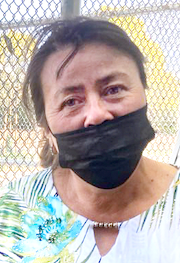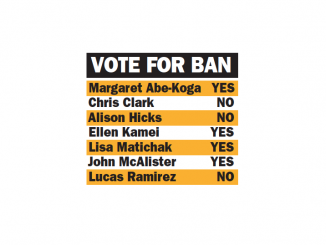
BY ASTRID CASIMIRE
Bay City News
When Lupita Lara was homeless a decade ago, she had to figure things out on her own. Now as a case manager for WeHOPE, an East Palo Alto nonprofit that serves people who are unhoused or living in their vehicles, she is giving the help that she never got.
“I was homeless in 2011 and I wish that the help that there is now, I had with my case manager. I would just do it myself,” Lara said. “I wanted to help other people who have been homeless to let them know: It’s OK. We’ve all been there. I understand what they’re going through and can help them.”

WeHOPE runs an RV parking program at 1798 Bay Road. The parking lot provides a safe place for up to 20 RV dwellers to park their vehicles for free. Residents also receive free amenities and meals so that they can save money for housing in the future.
Half of Bay Area renters spend more than 30% of their income on housing, according to the Bay Area Equity Atlas, a regional data hub that analyzes data and reports on inequality trends.
High rents sometimes pushes low-income people out of their homes, out of the state, or onto the streets. In 2019, 1,512 individuals were counted as homeless in San Mateo County. Of these, 494 lived in motor homes, having to park on the streets and contend with city laws that might ban parking in certain areas or at certain times.
Rising rents pushed Maria Elena Vasquez and her husband to move into an RV, where they now live at WeHOPE’s parking program. Vasquez has lived for the last two years at the Bay Road site, where she feels safe and protected after living on the streets.
“It’s ugly living in the streets,” Vasquez said in an interview that has been translated from Spanish. “Here we feel protected.”
After Vasquez’ landlord doubled the rent of their Menlo Park studio — they would have had to pay over $3,000— Vasquez’ husband bought an RV for a one-time cost of about $4,000.
The challenges of RV living
Buying the RV was cheaper than paying monthly rent. But living on the street came with its own challenges.
“We parked wherever we found a spot,” Vasquez said, adding that she worried about being robbed or that “someone was going to shoot me because I worked at night and got home in the early morning.”
At the parking program, residents get free water, electricity, showers, meals daily and 24-hour security. Renting a spot at some private RV parks can cost $80 per night or over $1,000 a month in the Peninsula.
“Thank God they haven’t charged us anything since the day we moved here,” Vasquez said. “All of that helps us save the little money we do get…We have a lot of help from the program, but it’s not enough because we want to have a place to live.”
But the search for permanent housing has been long and fruitless so far. Vasquez, who has been unemployed because of the pandemic, said she has filled out multiple applications but has not heard back from any. The waitlist for affordable housing can be months, sometimes years, long.
Ladder out of homelessness
Since the start of the program in 2019, WeHOPE said it has helped 34 of its past 73 clients move into permanent housing. This May, the park was full, with five people on the waiting list.
As WeHOPE’s lead case manager, Lara helps connect residents to health care, housing applications or life logistics like getting a license.
“I advocate for them as much as I can,” Lara said. “My clients know they can call me anytime they want … I work 8 a.m. to 5 p.m. but I’m always there for my clients.”
Her proudest moment was when one of her clients bought their own home with the money they saved while living at the park.
“A lot of clients say that I’m a little strict, but in the end they thank me. So she thanked me for pushing her. She thanked me for always being on her,” Lara said.
Modular homes
There are also two modular homes on the Bay Road site that offer a temporary place to stay while families search for permanent housing. The modular homes are prefabricated steel units complete with bedrooms, kitchen space, common spaces and amenities.
For the Samaniegos, a family of four (their picture is above), moving out of their RV and into the three-bedroom modular home in April has given them much-needed space.
“We’re very grateful…We have more space for cooking and our own rooms. We’re more at peace,” Teresa Samaniego said.
Her sons, high school students Edwin Samaniego and Jose Sameniego Jr., said moving into a home means they’ll have their own space to play video games and enjoy their mom’s home-cooked meals.
The modular homes are a project of United Hope Builders, a nonprofit that builds modular steel homes to help create affordable housing. Pastor Paul Bains, founder/president/CEO of WeHOPE and chairman of United Hope Builders, said that they plan to produce three to four modular homes each year.
As for the parking program, Bains said that WeHOPE started the RV parking program in partnership with the city of East Palo Alto to create a safe place for families to live. The program costs about $374,000 to run for the year.
Most people who live in RVs in the city are working families, Bains said, and not people who are trying to cause trouble.
“People just needed a hand up,” Bains said. “Most families are local families. They couldn’t afford to live in places because rents kept going up and up. That made it almost impossible for them to live where they work.”
Bains, like Lara, emphasized that the program is not a permanent place for people to stay, but a “stepping ladder” to get them out of the cycle of homelessness.
Residents in the parking program must participate in classes — such as cooking classes, financial literacy or anger management — and meet with case managers regularly in order to stay at the park.
“We don’t believe love is love unless discipline is in it. The programs create on-ramps for people to get back to self-sufficiency,” Bains said.
East Palo Alto led the way
East Palo Alto was the first city in San Mateo County to create a parking program for RV residents, pioneering the way for other cities to do the same.
Redwood City began its own program in October 2020. Their program can support about 40 RVs and is run by LifeMoves, a Silicon Valley nonprofit dedicated to finding solutions to homelessness.
LiveMoves’ vice president Brian Greenberg said the creation of parking programs like the ones in East Palo Alto and Redwood City are a response to increasing levels of homelessness over the last two years. “Both East Palo Alto and Redwood City took a leadership role in establishing this and looking at not pushing people into the next community but looking to work with them in their own communities,” Greenberg said.


